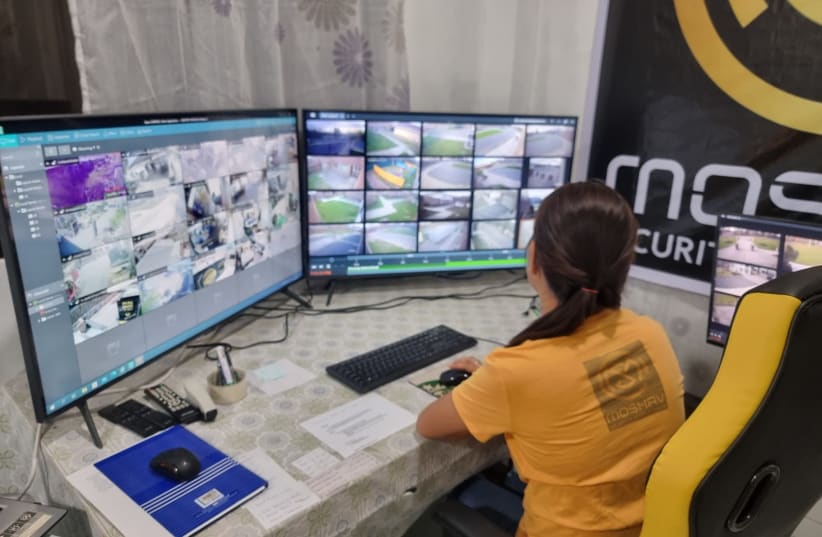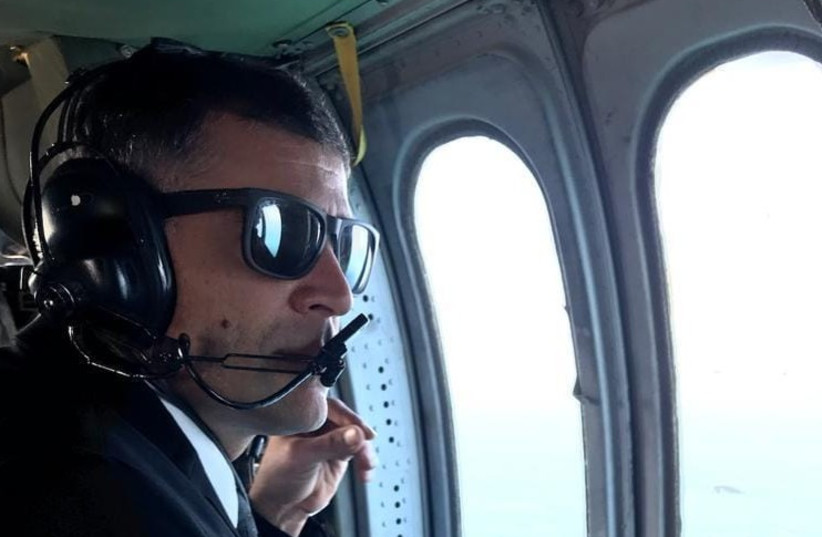A former Israeli secret service official has launched an international security venture offering services to Jewish institutions while combining security cameras, artificial intelligence and a control room based in the Philippines.
A security control room in a secret location in the Southeast Asian archipelago nation hosts the most surreal situation: a group of local female observers, wearing yellow T-shirts with the Hebrew word Moshav (village), who were trained by former IDF and Israeli Special Forces personnel, following security cameras in a New Jersey suburb. The two observers discuss whether a group of men running toward a synagogue in the middle of the night are a threat. The New Jersey synagogue is a client of "Moshav" - a new and savvy international security firm.
Moshav was established by 43-year-old Matan Moyal, who served for 20 years in various roles in Israel’s air force and secret service positions. He commanded a special operations unit in the IAF and also personally protected high-ranking Israeli state officials. Moyal also served Israel overseas, where he acquired a unique understanding of Jewish communities across the globe and the way they try to secure themselves.
“After seven years of meeting Jewish communities across the world, I realized that they weren’t securing themselves in an effective way,” he told The Jerusalem Post.
“The world is full of billions of security cameras, whether in synagogues, playgrounds, homes, government offices, public sites and other [places],” he said, adding that although “most of these cameras are interrogation cameras that can help law enforcement look back at an event and draw conclusions accordingly - but most of them don’t have the ability to assist in managing an event while it's happening.”
“We changed the equation: our cameras broadcast live and are monitored in real-time when an event happens," he said. "We don’t need to wait to see what happens after it ends, but rather manage it properly” on the spot.
Moyal and his partners created their venture to make the security of Jewish institutions more effective and even cheaper. “Instead of a synagogue or Jewish community center having to pay someone to actually sit in front of a screen full time, we offer this service remotely - in the Philippines.
THE MOSHAV Security Control Center provides a human response by continuous observation and control online of emerging threats while giving notice to the relevant parties for immediate assistance and of course an alert notice to the customer.
The Control Center is managed by Eyal Feldman, a former commander in IDF combat engineering corps and the commander of an operations room. In addition, he was a special adviser to the Israeli Defense Ministry.
“Eyal lives and works in the Philippines and has trained the observers there to protect Jewish institutions around the world," Moyal said. "Just as the tech world has outsourced many of its services to India or Asia, we found the right mentality and knowledge in our Philippine employees - and this allows us to offer a cheaper service, especially when it's night in the US because of the different time zones.”
Moyal explained that the combination of human command and control “along with the analytical capabilities we implant in customer cameras, brings the monitoring capability to the next generation.” He said that “from our security experience and understanding, we have identified that the optimal security in remote control is the ability to combine analytics with the human factor.
“A complex cannot function without analytics, but analytics alone is not enough," he said. "There is not and will not be a substitute for analyzing the situation and making decisions in real-time by the human factor.”
The company's security cameras are connected to a unique technological algorithm that uses artificial intelligence (AI) to recognize suspicious objects and marks them according to set criteria.
“You for instance decide that there should only be three people at the entrance to an institution at night," Moyal explained. "As soon as there are more than three people in the suggested area, the system will immediately send an alert to one of our security analysts in the Philippines. The system can also identify fire and smoke. It can even count how many people entered the building at any given time.”
MOSHAV'S CUSTOMERS are Jewish communities in Europe and the US, the security entrepreneur said, but “we want to reach Jewish communities across the world. We are starting to penetrate the market in Brazil and other countries in South America.
“Our cameras have been securing buildings of Jewish communities, schools, community centers, synagogues and lately even private homes that are usually in areas with a large Jewish concentration.”
Even though this is a business, Moyal said that his first interest is to supply security to Jews worldwide – and only afterward more general clients.
“Our main focus is to provide security services to Jewish communities around the world, among other things out of the desire to allow them to live as Jews in a full and open way," he said. "We would like to minimize external threats that Jews are at risk of. We are sometimes approached by customers from the general public in these countries and we are open to providing them with services.”
Moyal said that Jewish organizations can save thousands of dollars a month if they use his service since they won’t need to hire full-time security personnel to watch the security cameras.
“We have the most advanced technological-security product of its kind in the world that includes a human element, which allows us to provide our customers with a better and more efficient security service than what they would get if they’d hire locals to monitor security cameras 24/7 without proper training in monitoring and managing the incident.”
THE COMPANY built its control room based on the work of IDF observers - mainly female soldiers who go through an in-depth training plan on identifying targets, the top security expert said. “The observers also incorporate sharp professional human judgment in order to manage the security cameras deployed in the field.
“The observers in our control rooms undergo training and professional focus according to different types of areas such as community buildings, synagogues, solar farms, residential buildings and others – so that their understanding of the site they are watching is complete and clear,” he said.
“The ability to filter between false events and true events is performed only by direct observation of what is happening, data processing and human judgment,” Moyal said, adding that the ability to manage a real event, track what is happening and report in real-time "is possible only with the help of a quality human factor.”
The Moshav founder explained that there is always a local point person that receives the information from the control room and is instructed how to manage a crisis situation according to intelligence that the observers obtain from the security cameras.
“We call the local security representative of the organization and they know who to call locally," Moyal said. "At the end of the day, you need the assistance of someone on the ground who can alert local law enforcement and volunteers from the Jewish community.”


